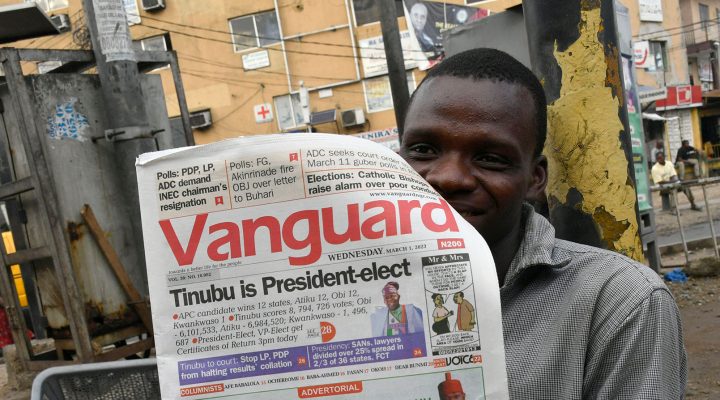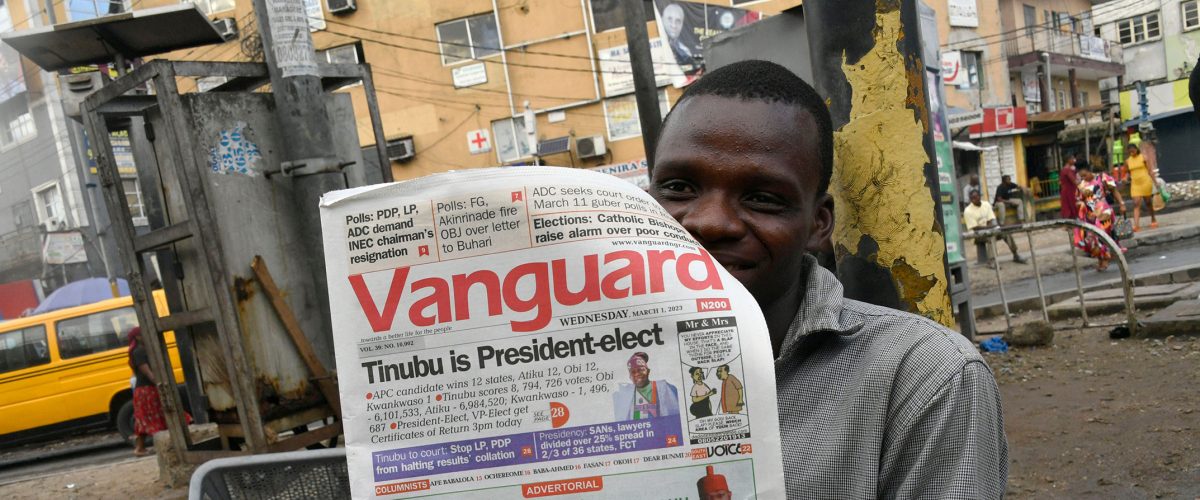With the U.S. presidential election now over and a winner declared, one thing people may need to do — particularly those whose candidate failed to win the election — however difficult, is to adjust to reality and learn to live with the outcome.
I know it’s not an easy thing to do, having lived through it myself in my home country. In 2015, when Muhammadu Buhari competed against Goodluck Jonathan for Nigeria’s highest political seat, my choice was the latter, who at the time was seeking reelection.
For all his shortcomings and things he was accused of as president, some of which I believed were exaggerated by political opponents, I considered Jonathan a better candidate than Buhari. But he lost the election. Buhari went on to rule for eight years, and when it was time for another election in 2023, I pitched my tent with Peter Obi against Bola Tinubu, who is of the same All Progressives Congress Party as Buhari.
 Like me, many Nigerians rooted for Obi, the Labor Party candidate, as he is considered to be a different kind of politician devoid of the ostentation and corruption associated with many Nigerian politicians. Eight years of Buhari, many Nigerians agree, had, contrary to his promise, worsened socio-economic conditions in Nigeria. The change he promised was a ruse, and this was evident from the first year of his administration.
Like me, many Nigerians rooted for Obi, the Labor Party candidate, as he is considered to be a different kind of politician devoid of the ostentation and corruption associated with many Nigerian politicians. Eight years of Buhari, many Nigerians agree, had, contrary to his promise, worsened socio-economic conditions in Nigeria. The change he promised was a ruse, and this was evident from the first year of his administration.
I lived and worked in Lagos as a journalist, and toward the end of Buhari’s first term, I was faced with financial challenges caused by low and infrequent salary payment. This forced me to quit my job and choose to go solo as a freelancer. I traveled to the United States initially for a short visit before eventually choosing to stay back after weighing my options. It was from here that I followed the Nigerian election campaigns that culminated in the presidential election of last year.
Victory for Obi would mean victory for Nigeria, the beginning of a new foundation to restore hope to a land so gifted by nature it’s lamentable any of its citizens has to seek succor anywhere else. That’s the consequence of ethnic and religious politics in the country, a testament to the quality of leadership since the country’s independence in 1960. So passionate was I about Obi that I contributed $100 to his campaign. I transferred the naira equivalent of this amount to a Labor Party campaign account. If I could not be there in Nigeria to cast my vote, (I had, by the way, never voted in any of Nigeria’s previous elections, a testament, in part, to my faith in the electoral system) I could show my support in the best possible way I could.
“Against all expectations, Obi lost the election.”
Against all expectations, Obi lost the election. The results showed he placed third. Feeling cheated, Obi filed a case in court to challenge the results of the election, and on the day the Supreme Court delivered judgment, as I tuned to the live session and listened to one of the judges talk about the Labor Party’s petition, I thought I shouldn’t waste my time. The outcome was obvious, and true to my premonition, Obi’s case was dismissed for lack of merit. Today, we have a Bola Tinubu as president.
Apart from the All Progressives Congress Party being accused of rigging the 2023 presidential election, Tinubu faced all manner of accusations by his political opponents. He was accused of being a drug dealer, of forging his academic certificate, identity theft and holding dual citizenship (the last of which, from media reports citing documents Tinubu filed with the country’s electoral body, he denied holding) among others. All of these were dismissed as inconsequential by the appeal and supreme courts.
Comparisons
Like Tinubu, Donald Trump faced legal challenges that included inciting the attack on the U.S. Capitol on January 6, rape and falsifying documents to mislead authorities, none of which, even when he was convicted, was able to stop his Nov. 5 victory. Writing about the U.S. election, Emmanuel Ogebe, a Washington-based lawyer and political analyst who witnessed Nigeria’s Supreme Court deliver judgment on the presidential election dispute filed by Obi’s Labor Party, recalled his impression of it: “It is not only the constitution that died today. Our moral values and culture as a society died with it. The very soul of the nation has been condemned to death row in (this) mass casualty fatality,” he said.
Comparing that scenario with America’s recent election, Ogebe stated: “Nigeria’s Supreme Court affirmed the worst election in the country’s history, allowing a man of dubious identity with forged documents to the presidency. … Today the sentiment is the same for America.”
He continued: “My condolences go to America’s youth who now see a country where it is a liability to be good and live right as a prosecutor but a profitable enterprise to do wrong and run as a felon.”
Just as some people feel about Tinubu, Trump “successfully conquered the American nation, its intelligence agencies, intellectuals, academics, Constitution, justice system and jurists after a four-year battle, Ogebe further stated. “Truly parents can now tell their children, ‘If you’re twice impeached, steal state secrets, incite insurrection against your country, convicted for fraud to influence elections and found liable for sexual assault, you can be a leader of America and do it all over again.’”
“Since the Nigerian presidential election last year, things have gone from bad to worse in the country.”
Since the Nigerian presidential election last year, things have gone from bad to worse in the country. Following a set of economic policies implemented by the Tinubu administration, the economy has taken a tumble, leading to the worst inflation and cost of living crisis in Nigeria’s history. Worse, the acrimony generated by the election, with its ethnic and religious schisms, is yet to abate.
All you need do to confirm this is to go online and check the comments particularly as it relates to the major participants of that disputed election. The vitriol and hate speech mostly by suspected supporters of both sides or people believed to be on the payroll of politicians is something many may find offensive.
I’ve seen a similar pattern in the U.S. prior to and after the Nov. 5 election regarding Trump and his challenger, Kamala Harris. Trump’s supporters insist he’s the man to fix America’s border problem, revitalize the economy and take America back to God. In addition to enacting tight border policies, Trump also promised to deport millions of undocumented immigrants and, regarding taking America back to God, stopping the LGBTQ movement as a group.
It doesn’t matter how this impacts human life or whether the president-elect’s promised actions with regards to dealing with his fellow human beings is contrary to God’s teaching or whether God will approve of the way he chooses to go about it. Some of Trump’s supporters feel it’s not a job for saints anyway, if ever there was one.
Facing reality
So, coming to terms with post-election reality can be difficult. But it could be more tolerable particularly if those on the winning side would evince humility and respect for others. Either way, doubling down or continuing with the provocative ways to rub in insults or seeing this as “our victory” leaves one no better than a victim of war himself, in perpetual strife.
“A change of attitude could go a long way in soothing souls.”
A change of attitude could go a long way in soothing souls. This world, after all, belongs to us all, whatever you think of yourself. We are all God’s children, created in his image. Differences in ideology, attitude and all, are understandable but should the acrimony continue to no end? To what end?
When Trump said, for instance, during his victory speech, that he would unite Americans, does he mean it?
A recent US News and World Report column by Cecilia Smith Schoenwalder citing a Pew research survey states that “both Trump and Vice President Kamala Harris called for unity at several points during their campaigns, though Trump’s message was usually followed by verbal attacks on Democrats. And unity might prove to be a problem for Trump. More than 40% of Americans are confident he can bring the country closer together, but nearly 60% express little to no confidence in his ability to do so.”
In essence, words and actions matter a lot and time will tell whether what the incoming president promised is mere rhetoric in the euphoria of the moment or a statement to be followed through.
Anthony Akaeze is a Nigerian-born journalist living in Houston.
Related articles:
Ten wayfinding points for post-election disciples | Opinion by Mark Tidsworth
The country I know | Opinion by Elijah Zehyoue
What is left is to resist | Opinion by Susan Shaw


